A recent question a reader asked was about the name “Yoshi” and why it’s sometimes written “Yossy” on some Japanese things. Apparently, some believe this “Yossy” spelling is the intended spelling of the name and that “Yoshi” is actually incorrect. So what’s the real deal? Here’s a look!
First, here are some examples of “Yoshi” being spelled “Yossy” in some Japanese materials. Here’s the box art for Yoshi’s Island:
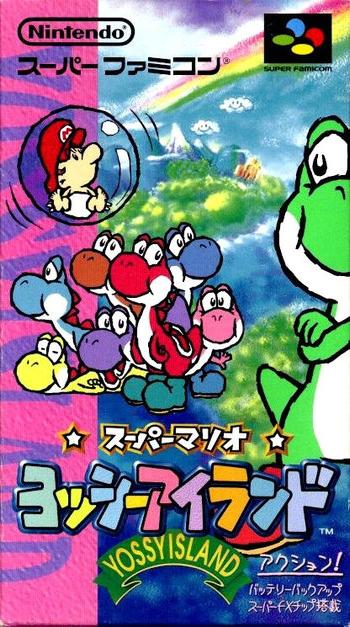 |
Here’s “Yossy” on the official Japanese site for Yoshi’s Cookie:
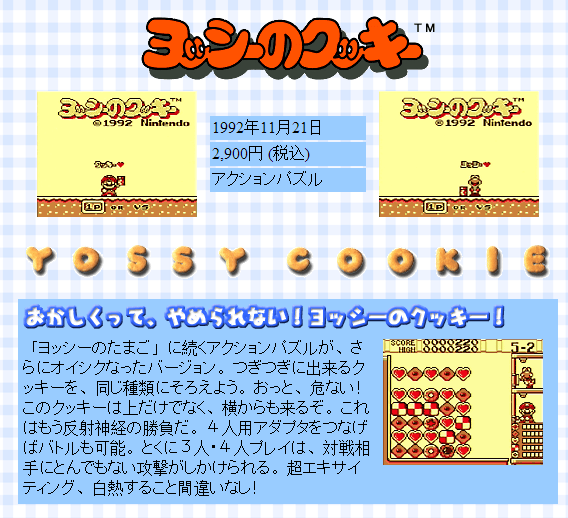 |
Even the official URL for a later Yoshi’s Cookie game spells it as “Yossy”:
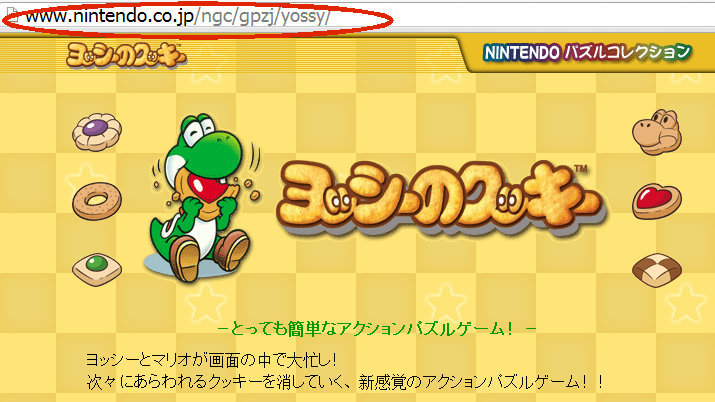 |
And here’s Yossy in an official manga:
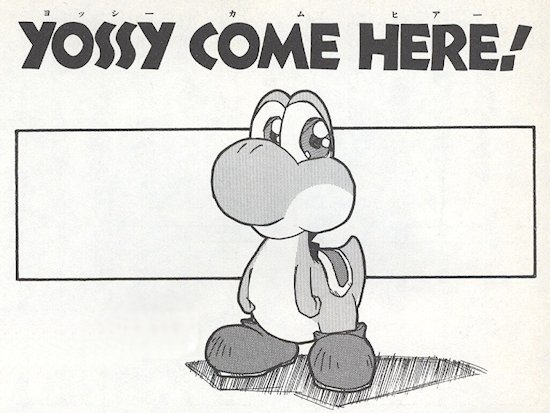 |
So we see that sometimes Nintendo officially spelled his name as “Yossy” on Japanese materials… but not all the time. The majority of the time his name is spelled “Yoshi” on Japanese things:
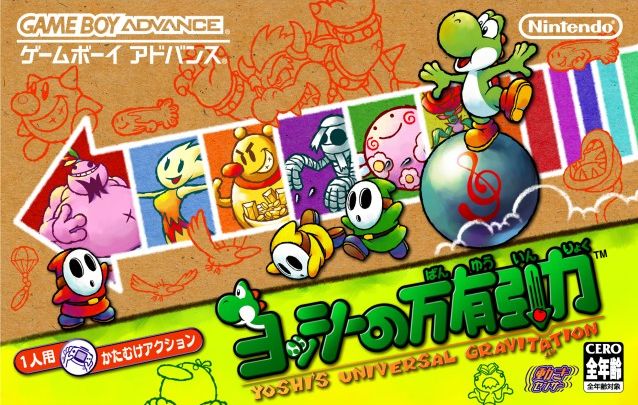 |
And here’s good ol’ Yoshi’s Story:
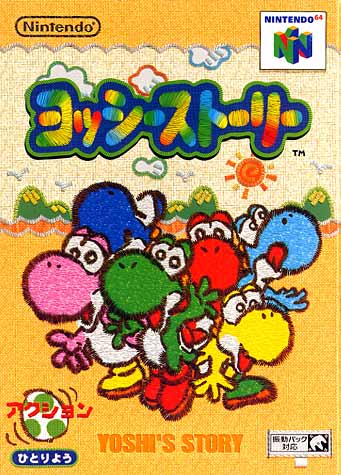 |
So what’s going on? Why is Nintendo spelling his name multiple ways? Which name is right?
It all boils down to the fact that there are two main, different ways of writing Japanese words using English letters. Here’s a quick history lesson:
- Back in the late 1800s/early 1900s, after serious contact with the West was reestablished, many Japanese scholars advocated replacing the existing writing system with one that used English letters. A system for doing this was devised, but the way it works was weird. They made it easy to learn and understand, but words written in this style aren’t pronounced the way they look. It’s hard to explain quickly, but basically this system was designed for Japanese people to write their own language.
- Foreigners, on the other hand, devised a system of their own that lets you write Japanese words with English letters that DOES make the pronunciation of words clear. This system was designed for outsiders to learn and speak the language. For the most part, this style is what most translators and students of the Japanese language will use and encounter.
The problem is that while almost everyone in the world is familiar with the second system, the first system is what is taught in Japanese schools. So this often causes weird situations when name spellings are dictated by the Japanese creators. These creators will use English spellings based on the system they were taught, not really knowing that the rest of the world will pronounce their spellings differently than intended.
To make matters worse, within each spelling style there are all sorts of minor variations and weird exceptions and such. It can be a language landmine if you’re not careful. For more info about these spelling system differences and their histories and all that, there’s a good article on Wikipedia here.
Anyway, that’s enough general talk – let’s look specifically at the case of Yoshi:
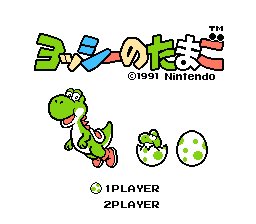 |
First, in Japanese, his name is spelled as ヨッシー. When pronounced, this is like “yo shee”, with the “sh” part held for a little longer than usual. When a consonant sound is held like this, it’s usually doubled in the spelling, but “ssh” looks odd and might cause some people to give the wrong pronunciation. The “ee” part is a little longer than usual too. I don’t know, it’s tough to explain unless you’ve studied the language, but in any case, “Yoshi” is the closest approximation with the second style of spelling that doesn’t look awkward.
Using the Japanese style of spelling, it would be a little more like “yossi” or “yossy”, although the latter style is a little rarer to see.
In essence, some folks on the Japanese side thought, “Hey, we should write ヨッシー’s name in English here to make it look cool. Since I learned how to spell Japanese words with English letters in school, I’ll put that knowledge to use!” And out came “Yossy”… but the intended pronunciation is still “Yoshi”. They didn’t realize that for English speakers, that spelling would be pronounced more like “yaw-see”.
To sum everything up, you can just consider “Yossy” an alternate spelling of “Yoshi” that’s still pronounced like “Yoshi”. This clash in English spelling systems – together with the famous ”L and R problems” in Japanese – is why I often say that even when a Japanese creator explicitly gives an English spelling of a name, you sometimes have to be cautious about it. What they intended and how it really comes across to English speakers doesn’t always match, as we can see here.


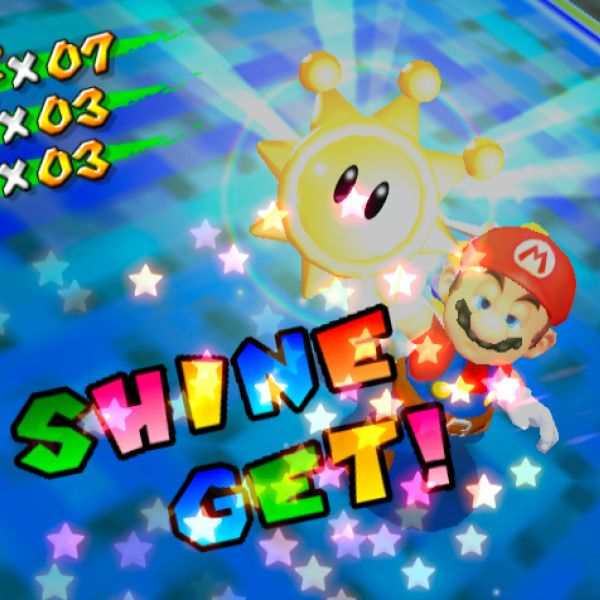
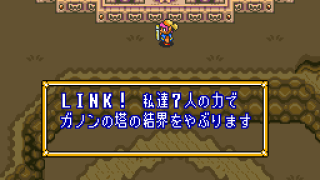
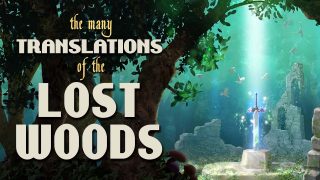
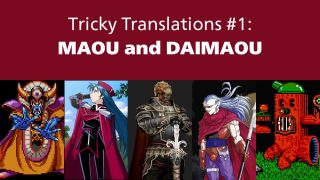
I always thought “Yoshi” was a translation error by NOA. I also don’t speak Japanese; great article as usual!
I also have a request: Can you look at how Grunty’s and Jamjars’ rhyming was handled in the Japanese versions of Banjo-Kazooie and Banjo-Tooie? Thank you.
So the change from “Yossy” to “Yoshi” was a deliberate decision by Nintendo of America? I always thought it was an error caused by a recursive translation, like so:
1. English word “Yossy” is created.
2. “Yossy” is transliterated into “ヨッシー” using the Nippon-siki or Kunrei-siki systems (taught in schools).
3. NoA transliterates “ヨッシー” back into English using the Hepburn system (more common) to make “Yosshī”, but removes repeated letters and macrons to make “Yoshi”.
What I originally wondered is why “si” sounds in English words are transliterated as “シ” instead of “セィ” in order to enforce the “s” sound as opposed to “sh”, like “ヨッセィー”, but asking a question like that is like asking why they pronounce “ジ” as “ji” instead of “zhi” to distinguish it from “ヂ” (also “ji”).
Now I need to wonder why they neglected to consider English pronunciation when they romanized “ヨッシー” as “Yossy”.
And now a question I previously thought answered is right back to not being answered: in Mario Party 1 for the Nintendo 64, after completing a mini-game in the Mini-Game House with Yoshi, the announcer will say “Yah-shi Wins”.
I dunno, my take on it is that it went like this:
1. Japanese developers create the ヨッシー character and his name.
2. Some people on the Japanese side spell his name as Yossy while more savvy people on the Japanese side also spell it Yoshi. This means there are two spellings in use.
3. Translations of Yoshi games go with the custom Hepburn romanization method.
This results in “Yoshi” being used most of the time, but “Yossy” appearing every once in a while.
So there was no “changing” per se by NOA, and there was no need to consider the pronunciation of “Yossy” on the Japanese side, because for native Japanese speakers, its pronunciation should be obvious. So it’s basically just a big ball of well-intentioned mix-ups, which this post tries to untangle a bit.
I always saw the Yossy thing as Nintendo trying to make the name Yoshi, which doesn’t seem particularly non-Japanese, a little more English and exotic. Of course, not speaking English, they didn’t realize how painful it is to the English-speaking brain. I cringe every time I see Yossy.
Usually, when one of my friends sees Nihon-shiki or Kunrei-shiki romanize “shi” as “si” he’s just like “NO. NO. NO. NO. NO.”
Honestly, I’ve seen スィ used a lot more often than セィ (though compared to シ, either of these alternative spellings to “si” are still extremely rare).
Funny, we all called him YO-shee growing up (with no Japanese influence); all these years later, my son’s initial gut pronunciation was definitely closer to YAH-shee, which drives me up a wall.
Fun fact: A Japanese nickname for Yoshi is “Detteiu” (でっていう), after his signature sound effect.
Oh god, I finally get what all those でっていう jokes mean from old variety shows I saw 😯 An old mystery is now solved, thanks!
Might also be worth mentioning that “yoshi” (よし, pronounced with the tapered “i”) basically means “okay” or “alright” in colloquial Japanese.
Wait, adult Bowser was in Yoshi Topsy-Turvy?
While we’re on the subject of Yoshi: page ten of the Rad Project contains an anecdote about a Rayearth fansub that translates the -chan suffix as -ster consistently. Is that also how Super Mario RPG’s “Yo’ster Isle” came about? Or was that name equally bodacious in Japanese?
No, “Yo’ster Isle” is a pretty straight translation of ヨースターとう, which is the Japanese name of the island where Yoshi lives in Super Mario World (the first world, in other words).
The official English name for the place is “Yoshi’s Island”, but the translator of Super Mario RPG never got the note, and went for a straight translation instead.
Super Mario RPG has a lot of other similar naming issues where items, places and characters are referred to by the wrong names.
Well, neither is very right. It’s a play off of Easter Island (イースター島). I guess Yo’ster is more accurate to at least the original reference, but neither is great. That said, I can’t really think of anything better either.
Hehe, I never really looked into it and assumed that it was ヨッセィー over there. It makes so much more sense now. Thanks!
I think i remember hearing about these two translation systems on my DVD of the original Godzilla movie. Iirc, the historian guy on it explained that the spelling of “Godzilla” was based on the Japanese school taught system, while “Gojira” is based on the foreigner learned system. Though, he called the two translating systems by their actual names, which i don’t remember what was off the top of my head.
I could have sworn “Godzilla” was the foreigner name. Was it?
Neither actually.
ゴジラ would be Gojira under Hepburn (western romanization) or Gozira in Kunrei (Japanese taught Romanization). It’s a portmanteau of ‘gorilla’ and ‘kujira’ (whale), so neither ‘god’ nor ‘zilla’ have anything to do with it and in fact, it’s splitting the middle syllable in Japan into multiple syllables. As for why, the middle syllable is semi complicated and one of those sounds that there’s not a ready English equivalent for. In the past, it’s been di, ji, or zi (or combinations thereof). The pronunciation for it is often given as ‘dzi’ (it can’t come at the start of words, foreign and onomatopoeic notwithstanding), so what may have happened is it was Romanized (or told to be pronounced) as “Godzira,” but the syllabic structure should have been “go/dzi/ra”. Not “god/zi/ra.”
“it can’t come at the start of words, foreign and onomatopoeic notwithstanding”
Sure it can.
人類 being the first word that comes to mind.
You’re correct. Got it mixed up in my head with ヂ, the other ji.
I think I kind of remember even NBC announcing the SMW cartoon as “Super Mario Bros. 4” (during the 1991-92 season, the last time the network ever ran cartoons).
Though the only proof I have is an old commercial bumper (I found and put on youtube) that calls the show “Captain N and Super Mario Bros. World”.)
Wow, thanks for finally answering the whole ‘Yo’ster Island’ thing 🙂
I was thinking about this article today as I was typing in Japanese. Oddly enough, while the non-hepburn system of writing pains me to look at, I type that way! So when typing ファミツ, for example, I type famitu. It never works out well for going to websites!
I wonder if I am the only one who does it!
I never really learned how to formally type Japanese so I do it the smelly way of actually typing “t” then “s” then “u”. It’s hard to break habits like that though :X
It’s still a pain for me to type little katakana/hiragana characters. I currently do the “x” + whatever method, I feel like there’s gotta be a better way though…
Actually I have tried finding other methods and I am still stuck with the “x method” for Katakana. I really find it slows down my typing but I haven’t found/been shown anything better yet… I also have the habit of pressing the n key a ton for ん. XD
Also, I forgot to mention the pain of when I was a teacher in Japan seeing the kids write their names in romaji on the board during English lessons and see things like “Yudi” for “Yuji.” :shuddder: I had to remind myself that it was correct as well every time.
It’s nice to finally have a coherent explanation for that rather bizarre “alternative” Romanization method. We often complained in Japanese class back in the day about how it makes no sense to use such a backwards technique when perfectly suitable Romanization exists that does not require you to stop and think about it. But of course, you don’t have to stop and think about it if you’re starting from a native Japanese speaker’s viewpoint. Intriguing…
This article reminds me a bit of Pokemon; the names of individual species have official hiragana/katakana spellings and official romanized spellings which don’t always seem to match up phonetically (but your explanation for Yoshi/Yossy likely applies for Pokemon as well). For example, Meowth’s Japanese is ニャース, pronounced Nyasu, and officially romanized as Nyarth. It doesn’t seem like you’re very familiar with the Pokemon franchise, but just looking at and comparing the names of the monsters would probably be an interesting task in and of itself, since their names in both English and Japanese often have clever puns and the like.
Hmm… You say that ヨッシー (Yosshī) is meant to be pronounced ヨシ (Yoshi), but doesn’t that spelling make it clear that it’s meant to be pronounced “yohs-see” rather than “yoh-shee”?
Similar to the way ヨッシー (Yosshī) is spelt, we have タッシー (Tasshī), which is written as “Tassy” in the Latin alphabet. It follows that same “-sshī” ending. So unless you think タッシー (Tasshī) is meant to be pronounces タシ (Tashi), then there’s some inconsistency going on.
As for the romanized spelling itself, I have an example similar to Yossy; Luffy (loof-fee) from One Piece. My point being that whether or not it makes sense to you, it still can be correct. In fact, it’s a name. It doesn’t have to make sense. They almost never do. But when it comes to fictional names in translations, boy do fans go crazy.
Not really – I can see how there might be that alternative reading but I don’t see how it makes it “clear”. As it’s the consonant sound that gets held, it could be either a long sh, or if we assume that it’s the product of some sort of romanization, a long s. Since we can actually hear the word being said in many places with the “sh”, we can assume that was the intended pronunciation.
Tasshi can indeed be pronounced Tashi, I can’t say with 100% certainty what the intended pronunciation is there. It might be the intended pronunciation for all we know. The most I can offer is my best educated guess, since I don’t think the topic’s ever come up in a developer interview.
Name romanization and pronunciation is indeed a crazy, inconsistent mess, and you’re right in that it doesn’t always make sense.
All right. I see what you mean. But I’m pretty sure it’s supposed to be pronounced as it was written: Yossy.
I know they pronounce it with the ‘sshī’ at the end instead of the “intended” ‘sī’, but that’s the case for other similar words/names. If you listen to Japanese people pronounce Nessie (ネッシー, Nesshī) for example, we hear pronounced with the same ‘sshī’ ending as Yossy (ヨッシー, Yosshī). That’s how it’s written and pronounced in Japanese, so even when they write it our in the Latin alphabet right next to the Japanese spelling, they just go with what’s easier to say.
As far as I can tell, the Yossy spelling was consistently used in Japan up till at least Yoshi’s Story. At which point they acknowledged Yoshi is the official romanized spelling of the name, and they went with that in all future products in Japan. As for where it came from… Localizers probably thought Yossy would be hard to pronounce (not that that’s ever NOT been a consistent problem with names in unspoken media), so they changed it. Or maybe they didn’t know it was supposed to be Yossy, so they went with Yoshi because it was easier and close enough to how it sounds in Japanese. Those are my thoughts anyways..
I dunno, if “Yoshi” is the intended Japanese pronunciation, why did they bother with the sokuon at all?
Obviously I don’t know what’s going on behind the scene, but I can imagine something like this:
– The character was created, with “Yossy” being the intended romanization
– NOA either didn’t see the romanized name or found “Yossy” too Japanese-y, and gave him the more simple “Yoshi” name instead
– Like many other things in the Mario series, NOA’s decision prevailed and the “Yoshi” name was unified, starting from Nintendo 64
(The Nintendo Puzzle Collection website folder name was probably just an oversight in the website creator’s part)
This is so unrelated, I don’t know why I’m not finding an article that’s at least SOMEWHAT similar to my inquiry to ask it, but I would love to see some Japanese/English comparisons pertaining to the Monster Hunter series. I don’t think I’ve seen any “MonHun” representation on Legends of Localization, and while that is understandable (there is an outrageously large number of weapon/armor/item names and descriptions), I’d at least like to see some comparisons on the Monster names, or something.
If you ever get around to it, that is. I understand that it’d be a huge project, no matter which aspect of whichever game was looked at.
I mean, the weapons alone are insane, as each one has its own name and (rather thorough) description, even between weapons that upgrade to an identical-looking form. It must be quite a daunting task to translate all of that, especially knowing that most players would never stop to read EVERY description of EVERY weapon’s various forms within EVERY weapon tree…
Y’know what? Never mind. I couldn’t ask you to do so much work just to appease a longtime fan. But if you ever got into Monster Hunter, well, that’d be awesome.
Hi, I’m a Japanese Guy.
Things are very complicated.
But, the most important thing is how to pronounce the name of the green dinosour with bottomless stomach.
Listen to this.
https://www.youtube.com/watch?v=WNPS-YFEFok#t=19
Did you hear that?
The name is called Three times, and all those pronounciations are very natural for me.
Now, how should we put it down into letters?
Let me try.
Katakana(Japanese Phonograms): ヨッシー
IPA (The International Phonetic Alphabet): [ˈjo̞ʔˌɕiː] / [ˈjoˌʃiː](more English-ier)
Latin Alphabet through the Hepburn system: Yosshī
Latin Alphabet through the Kunnrei system: Yossî
Latin Alphabet for English Speakers: Yo-shee
Where is present official spelling ‘Yoshi’, ha?
There was a Nintendo’s decision, I think.
It was almost impossible to romanize the proper sound.
If did so, they always be unusual, weird or with distracting punctuation marks.
For example unusual double ‘s’ in ‘Yosshī’.
Distracting hyphen in ‘Yo-shee’ and it looks like a greeting.
So, creators gave up to keep the proper sound.
Simply spelling ‘Yoshi’, left it running to fix.
Underlying causes of this romanization problem are:
– No independent glottal stop (and its representaion) in English (against ‘ッ’ in ‘ヨッシー’)
– No independent long vowel (and its representaion) in English (against ‘ー’ in ‘ヨッシー’)
– No Latin-based canonical writing system of Japanese, even in Japan
– Slightly different sounds which consonants and vowels that two languages
share have (Japanese ‘sh’ is softer than English ‘sh’)
When Americans say ‘important’ in fast passage, a long vowel occurs at ‘po’ and a glottal stop occurs just before ‘nt’.
They do it naturally from stress accents.
We Japanese do not care stress accents so much (we hear pitch accents, which change meanings sometimes).
It is allowed to insert glottal stops and long vowels anywhere in a word.
And we have letters correspondent to them, such as ‘ッ’ and ‘ー’ respectively.
Conclusion:
The green dragon have two versions of his name.
An American name, and a Japanese name.
Japanese one can’t be represented in Latin alphabet.
If you want to say his name as an original Japanese one:
– say ‘Yo’ with short ‘o’ at first
– then sudden airflow cut at your throat
– instantly ‘she’
– and keep ‘eee’ long enough
Thanks.
As far as I’m concerned, Nihon- and Kunrei-shiki can die in a fire. It sucks and always will suck. We know our own phonology.
I wonder what Nintendo’s official statement on this is.
In any case, this seems to me like a “ketchup”/”catsup” scenario.
I think the real question here is:
“Yoshi, dinosaur or dragon?”
The answer is obviously horse.
Hi Mato, I wanted to say thank you for this article. I’m doing my last year of college studying abroad in Iwate-ken right now, and we have to do a research project to graduate. While I was trying to decide on a good topic, I remembered your discussion of Yossy and decided to research people’s romaji preferences. It turns out that people are really staggeringly inconsistent! I suppose that makes sense, because they just don’t use it very often. For my ankeito, I had people write several words in romaji, and something I found particularly interesting is that beyond the more obviously recognizable things like the du-dzu-zu differences and ti/chi differences, it’s whether or not you use h or y to represent the modified syllables (i.e. shu/syu) that changes the most. Some people seem to actually memorize it word by word, like writing both shusshin and syachou on the same page.
The thing I found most interesting, though, is that everyone I polled near campus (especially the young people) tend to have more Hepburn influence – almost everyone wrote tsu at the end of futatsu except for a few older people at the local library that wrote futatu. It makes me wonder if the modern world’s use of internet has increased the amount of times people see Hepburn words since foreigners tend to use them…
To be honest, for my conclusion, I’m thinking about trying to argue that Japan should switch to teaching Hepburn. It probably won’t go over well, but most people I’ve talked to (including my Japanese teacher back in Texas) find romaji almost useless. So while Kunrei-Shiki might be easier for Japanese people to learn directly from Japanese, if the only real time Japanese people are going to use romaji is when it’s translation related or they’re reading something in English, it seems like it might be better to just learn Hepburn since that’s the system that matters when dealing with foreign works… Especially since Nihon-shiki and Kunrei-shiki were invented during an era when they were considering romanizing Japanese, which it’s pretty clear they’re not going to do.
Anyway, sorry for this huge comment, but thank you again for your hard work and for inspiring me to research this! It’s just a small student project, but I’ve learned a lot!
Hey, uh. No one ever attended to why they say ヤーシー in games like Mario Party 1 and Mario Kart Super Circuit.